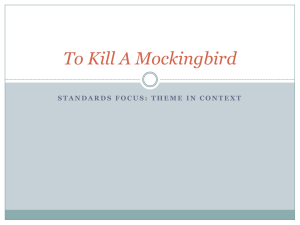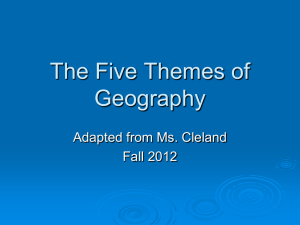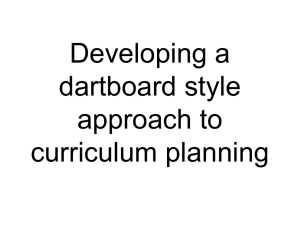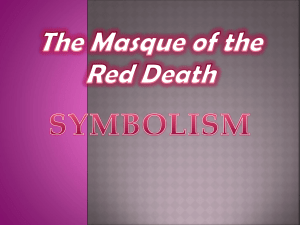Theme Lesson 2 PPT - ereadingworksheets
advertisement
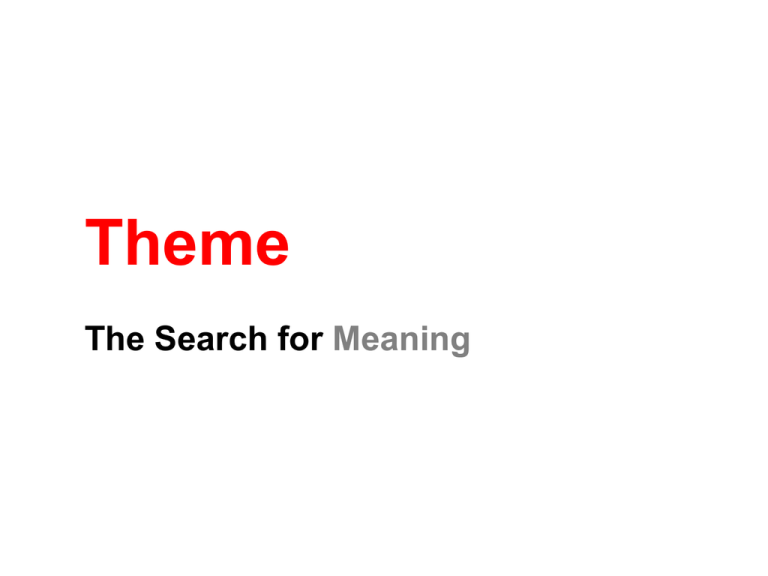
Theme The Search for Meaning What is a Theme? Theme: Life lesson, meaning, moral, or message about life or human nature that is communicated by a literary work. In other words… Theme is what the story teaches readers. Themes A theme is not a word, it is a sentence. You don’t have to agree with the theme to identify it. Examples Praise the day at sunset. First deserve, then desire. An ounce of prevention is worth a pound of cure. What is the theme? Carrie loved her phone and her tablet. She was always looking at one or the other. Her parents would try to talk to her about her life, but she would just ignore them or give them monosyllabic answers until they left her alone. When she was at school, she'd sneak peeks at her phone under her desk whenever she could get away with it. When she was at parties, she spent more time interacting with the devices in front of her than with the people around her. Even at concerts and sporting events, Carrie seldom removed her eyes from these tiny screens. One day Carrie was walking home from a friend's house and watching a funny video of people slipping on ice. She began crossing the street just after the light changed. She was so into the video that she did not notice the oncoming traffic. She walked directly into the traffic while laughing at the falling people on her tiny screen and was hit by a bus. Carrie sustained mild injuries, but both of her devices were destroyed. As far as she was concerned, her life was over. Example Answers Practice moderation with all things desirable. You can get too much of a good thing. Safety first. Explanation: Carrie loves to use her phone, but she needs to balance that desire with the more practical concerns of safety and wellbeing. Identifying Themes Themes are not explicit (clearly stated). Themes are implied. Themes are bigger than the story. Small World of the Story Big World of the Theme. Applies to the “Real” World. Themes are about the big picture. Not “Carrie should get off her phone.” Not “Phones can be dangerous.” Think BIGGER. Find “real” world advice that applies to many situations. Small World of the Story Big World of the Theme. Applies to the “real” world. Review 1. Theme is what we can learn from a story. 2. Themes must be inferred. 3. Themes are not limited to story specific details: they are about the BIG world. Practice 1. We’ll read each story. 2. Write what you think the theme is. 3. Write another sentence explaining what happens in the story that leads you to believe this. How does the small world of the story connect to the big world theme? Kelly had a job at the movie theater, but it didn't pay very much and she was sick of working there. Nonetheless, the work was steady and she needed all of the money that she could get. To her delight, Kelly got an interview at a big office downtown for a job that paid much more. The interview went very well and the bosses all but offered her a position. They said that she would fit the role well and they promised that they would call her back within two weeks. Kelly couldn't wait to quit her job at the movie theater. As soon as she got back she put in her two week notice. She spent the next two weeks bragging to her coworkers about her new high-paying job in the big city. Yet, two weeks passed and she received no phone call. When Kelly decided to follow up on her interview, she learned that the bosses had chosen a different candidate. Kelly was crushed. Example Answers • Don't count your chickens before they hatch. • Nothing is a sure thing before it happens. • If you are going to burn the bridge, wait until you first cross the river. Answer Explanation: Kelly conducts herself at her old job as though she had been hired at the new job. She should have waited until she received the job offer before she quit her old job; furthermore, when she quit her old job, she should have done so in a respectful way, without bragging to her coworkers. While most of his peers enjoyed high school, David did not. "I can't wait to get to college and really start my life," he'd often tell himself. When David got to college, he found out that it wasn’t much different from high school. "I can't wait to graduate and get a job so that I can really get started on my life," David would tell himself. When he graduated from college and found a job, David realized that he did not really like working that much. "I hate slaving away at work. I can't wait until my retirement. That's when my life is really going to begin," David told himself. He worked away his days and nights, enjoying them very little and always thinking about how things would be better when he retired. When he finally retired, he found that he was in too much pain to do the things that he had planned on doing earlier in life. Having nothing else to look forward to in life, David spent his final days on a bench in the sun, thinking about how much happier he would be in heaven. Example Answers • Plan for the future but live in the present. • Life is what happens while you are waiting for things to happen. • You have to stop and smell the roses. Answer Explanation: David spends his whole life waiting for the next stage of life. Consequently, he does not take the time to enjoy and appreciate his life while it is happening. Sadly, he never realizes how much he has missed. When she wasn't going to school or doing homework, Sharon spent most of her time drawing. She drew elaborate manga inspired scenes of heroic warriors and beautiful princesses. She drew detailed landscapes dotted with colorful monsters and menacing villains, but she never shared her work with anyone. Time passed and Sharon continued to develop as an artist. She had mastered the skills of shadowing and texturing her artwork and she graduated from high school. Too afraid to share her work with others, Sharon pursued a college degree in business rather than art, but she continued to passionately work on her artistry when she was alone. More time passed and now Sharon was managing a department at a large corporation. She didn't really like her job, but she was comfortable doing it. By now, Sharon had pretty much given up on creating her own art, but she still appreciated the art of others. Example Answers • You will never make a shot that you don't take. • Beauty unseen is beauty unappreciated. • You have to take a risk to receive a reward. Answer Explanation: Sharon seems to be a natural born artist who might have a promising and fulfilling career in art, but she chose a different route because she was afraid to expose her work to criticism. She may be comfortable working in business, but she isn't happy.
